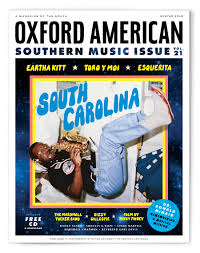 "At Hitsville U.S.A. recording sessions, when Motown Records producers would give James Jamerson, the studio’s in-house bassist, the charts for new songs, they provided him only the chord changes with no actual bass lines. No one could tell Jamerson how to play. No one could hear what he heard beneath a chord progression and melody. “They’d let me go on and ad lib. I created, man,” he told journalist Nelson George. “I picked things up from listening to people speak. From the intonation of their voices. I could capture a line. I look at people walking and get a beat from their movement. I’m telling you all my secrets now.” Jamerson died at just forty-five in 1983, and because Motown didn’t attribute the players on its sessions for years, his influence went largely unappreciated in his lifetime; the list of songs to which he contributed—as the anchor for the house band, known as the Funk Brothers, from 1959 until 1973—is staggering. More No. 1 hits, the label notes, than by Elvis, the Beatles, the Beach Boys, and the Rolling Stones combined.
"At Hitsville U.S.A. recording sessions, when Motown Records producers would give James Jamerson, the studio’s in-house bassist, the charts for new songs, they provided him only the chord changes with no actual bass lines. No one could tell Jamerson how to play. No one could hear what he heard beneath a chord progression and melody. “They’d let me go on and ad lib. I created, man,” he told journalist Nelson George. “I picked things up from listening to people speak. From the intonation of their voices. I could capture a line. I look at people walking and get a beat from their movement. I’m telling you all my secrets now.” Jamerson died at just forty-five in 1983, and because Motown didn’t attribute the players on its sessions for years, his influence went largely unappreciated in his lifetime; the list of songs to which he contributed—as the anchor for the house band, known as the Funk Brothers, from 1959 until 1973—is staggering. More No. 1 hits, the label notes, than by Elvis, the Beatles, the Beach Boys, and the Rolling Stones combined.
Jamerson arrived in Detroit in high school from his native Edisto Island in South Carolina’s Lowcountry, the state’s southeastern coastal region distinct for its geography and culture, of which Charleston is the main city. Here is a land rich in musical innovators. Listen to Alice Wine at home in Johns Island, who first shared the lyrics “Keep Your Eyes on the Prize,” an update of the hymn “Hold On” that became the famous civil rights anthem (track 21). Or Charlie McAlister, a singer-songwriter who created homemade ditties such as “Paradise” (track 9), with its wholly original sound. Or rapper and activist Benny Starr, whose song “Resurrection” (track 23) opens with a reflection on the landscape: “Where I grew up . . . water had such a profound impact on our traditions and the culture—what we ate, how we lived. Water is a life force, is rebirth and renewal. It’s real spiritual.” Like all of the country’s major Atlantic ports, Charleston County is American cultural bedrock.
It is fitting that this Southern Music Issue (the Oxford American’s twenty-first) devoted to South Carolina should come in 2019, as the nation moves to better recognize the tragic anniversary of the first sale of enslaved Africans on American soil, in August of 1619. About forty percent of the enslaved people brought to America came through Charleston; today most African Americans have roots in the city (some estimates go as high as eighty percent). Or to put a finer point on it, as Joshunda Sanders writes in this issue, “No Black person has a family tree that has not been pruned by slavery.” Acknowledging, parsing, and reckoning with this history is the prominent theme of this South Carolina music issue—as is celebrating the immense wealth of cultural heritage that has sprung from this small, proud place. Sanders’s very next line is equally as telling: “But just because some of my history is unknowable didn’t keep me from trying to do the spiritual work of reclamation.”
Other writers dig similar ground, mining South Carolina music history for fresh insight. John Jeremiah Sullivan tracks the Stono Rebellion of 1739 and the consequence of the colony’s subsequent banning of drums. Zandria F. Robinson listens to Ranky Tanky, whose music is “a crash course in Southern lessons and logic, wrapped well in sound.” Mark Powell revisits modern Spartanburg and its homegrown icons the Marshall Tucker Band. Sarah Bryan offers a memoir of old Myrtle Beach. The incomparable poet Nikky Finney memorializes the love shared between blueswomen Clara Smith, “Queen of the Moaners,” and her mentee and partner Josephine Baker. And Jon Kirby chronicles the other life of our cover star, Lake City–native Dr. Ronald McNair, a famous astronaut who was also a devoted and accomplished saxophonist.
One of the joys of the state-themed format of our Southern Music Issue series is having the opportunity to elevate lesser known artists alongside local luminaries. What an honor to hear among these many voices of South Carolina those like Charleston’s Bill Wilson, who released his first album at age seventy-six last year (track 22) and Columbia’s Aaron Graves, lead singer of Those Lavender Whales (track 11), who tragically died of brain cancer this year, at thirty-three.
Today, James Jamerson is considered an unparalleled bassist and pop composer (in its “100 Greatest” special issue, Bass Player magazine ranks him No. 1), a legacy he didn’t live to see recognized. It is in the spirit of Jamerson and his secrets that we present here a small cross-section of the ingenuity and influence South Carolina musicians are due. It begins with a contemporary band hailing from the Lowcountry, Ranky Tanky—named for a Gullah expression meaning something like “get funky”—a reclamation-reimagination project of the highest order, whose music is the perfect tone-setter for this issue. Cue track 1..." - Oxford American